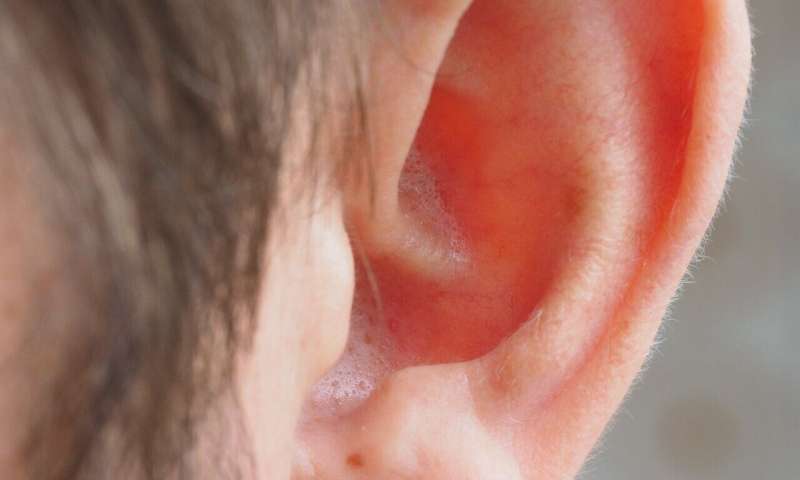Hear this: Healthful diet tied to lower risk of hearing loss

Investigators from Brigham and Women's Hospital have found that eating a healthy diet may reduce the risk of acquired hearing loss. Using longitudinal data collected in the Nurses' Health Study II Conservation of Hearing Study (CHEARS), researchers examined three-year changes in hearing sensitivities and found that women whose eating patterns more closely adhered to commonly recommended healthful dietary patterns, such as the Dietary Approaches to Stop Hypertension (DASH) diet, the Alternate Mediterranean (AMED) diet, and the Alternate Healthy Index-2010 (AHEI-2010), had substantially lower risk of decline in hearing sensitivity. The team's findings are published in the American Journal of Epidemiology
"A common perception is that hearing loss is an inevitable part of the aging process. However, our research focuses on identifying potentially modifiable risk factors—that is, things that we can change in our diet and lifestyle to prevent hearing loss or delay its progression," said lead author Sharon Curhan, MD, a physician and epidemiologist in the Brigham's Channing Division of Network Medicine. "The benefits of adherence to healthful dietary patterns have been associated with numerous positive health outcomes and eating a healthy diet may also help reduce the risk of hearing loss."
Previous studies have suggested that higher intake of specific nutrients and certain foods, such as the carotenoids beta-carotene and beta-cryptoxanthin (found in squash, carrots, oranges and other fruits and vegetables), folate (found in legumes, leafy greens, and other foods), long-chain omega-3 fatty acids (found in seafood and fish), were associated with lower risk of self-reported hearing loss. These findings revealed that dietary intake could influence the risk of developing hearing loss, but investigators sought to further understand the connection between diet and hearing loss by capturing overall dietary patterns and objectively measuring longitudinal changes in hearing sensitivities.
To do so, the researchers established 19 geographically diverse testing sites across the U.S. and trained teams of licensed audiologists to follow standardized CHEARS methods. The audiologists measured changes in pure-tone hearing thresholds, the lowest volume that a pitch can be detected by the participant in a given ear, over the course of 3 years. An audiologist presented tones of different frequencies (0.5, 1 and 2 kHz as low-frequencies; at 3 kHz and 4 kHz as mid-frequencies; and at 6 kHz and 8 kHz as higher frequencies) at variable "loudness" levels and participants were asked to indicate when they could just barely hear the tone.
Using over 20 years of dietary intake information that was collected every four years beginning in 1991, the researchers investigated how closely participants' long-term diets resembled some well-established and currently recommended dietary patterns, such as the DASH diet, the Mediterranean diet, and Alternate Healthy Index-2010 (AHEI-2010). Greater adherence to these dietary patterns has been associated with a number of important health outcomes, including lower risk of heart disease, hypertension, diabetes, stroke and death as well as healthy aging.
The team found that the odds of a decline in mid-frequency hearing sensitivities were almost 30 percent lower among those whose diets most closely resembled these healthful dietary patterns, compared with women whose diets least resembled the healthful dietary patterns. In the higher frequencies, the odds were up to 25 percent lower.
"The association between diet and hearing sensitivity decline encompassed frequencies that are critical for speech understanding," said Curhan. "We were surprised that so many women demonstrated hearing decline over such a relatively short period of time. The mean age of the women in our study was 59 years; most of our participants were in their 50s and early 60s. This is a younger age than when many people think about having their hearing checked. After only three years, 19 percent had hearing loss in the low frequencies, 38 percent had hearing loss in the mid-frequencies, and almost half had hearing loss in the higher frequencies. Despite this considerable worsening in their hearing sensitivities, hearing loss among many of these participants would not typically be detected or addressed."
The study included female health care professionals, which enhanced the validity of the health information collected and reduced the variability in educational achievement and socioeconomic status, but the study population was limited to predominantly middle-aged, non-Hispanic white women. The authors note that further research in additional populations is warranted. The team hopes to continue to longitudinally follow the participants in this study with repeated hearing tests over time and is investigating ways to collect research-quality information on tens of thousands of participants for future studies across diverse populations.
More information: Sharon G Curhan et al, Prospective Study of Dietary Patterns and Hearing Threshold Decline, American Journal of Epidemiology (2019). DOI: 10.1093/aje/kwz223

















